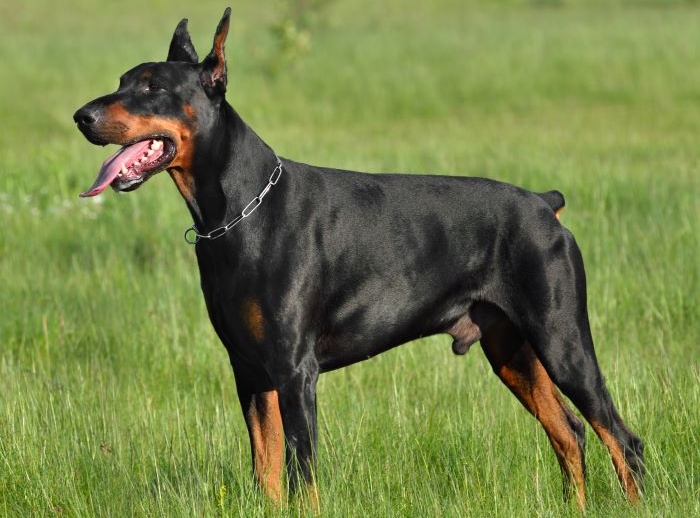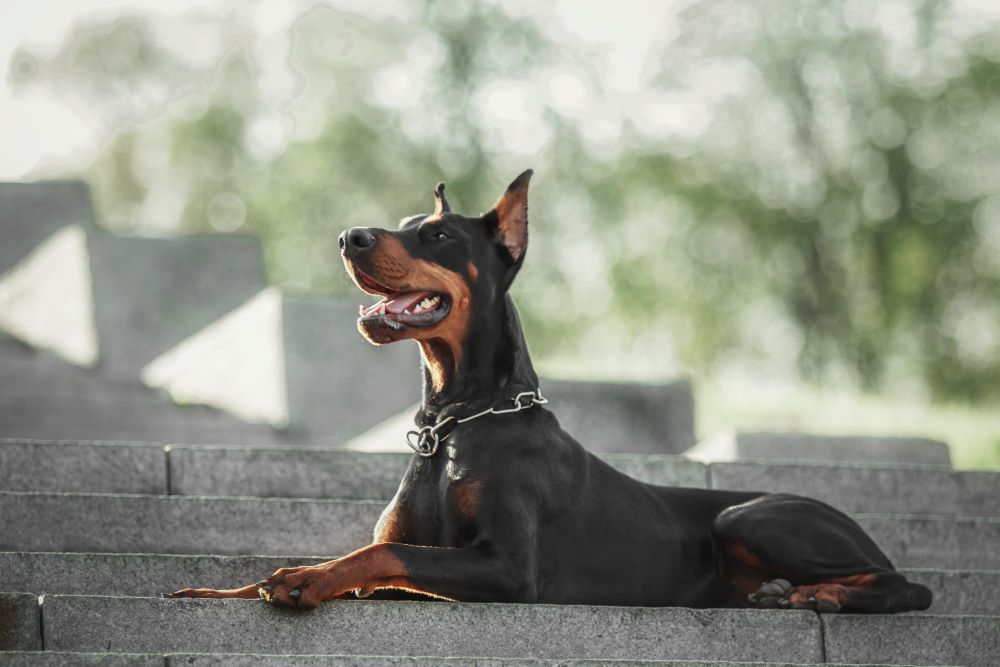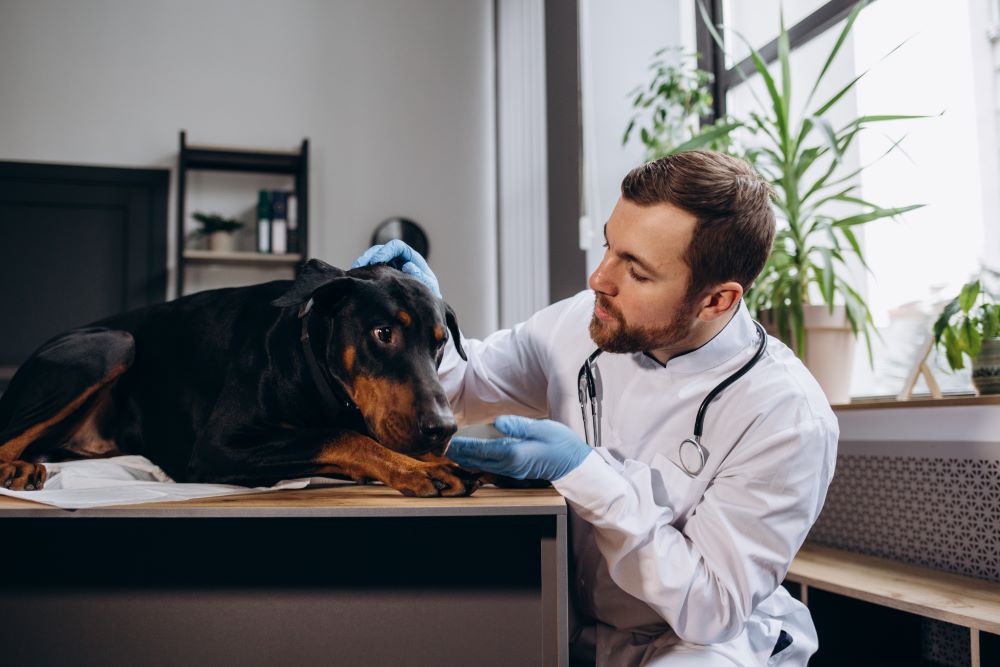Get Pet Insurance for your Cat & Dog

Zero
Documentation
Quick
Claim Process
Affordable
Premium
Terms and conditions apply*
- {{species}}
- {{indoorOutdoor}}
- {{suminsured}}
Doberman Pinscher Dog Breed Characteristics & Information

The Doberman Pinscher is often perceived as an aggressive breed due to its strong guarding instinct and protective nature. However, their temperament largely depends on training and socialisation.
Doberman Pinschers are often regarded as obedient dogs. In this article, we will understand their characteristics, tips for taking care of them, how to train them, and some health problems.
What is the Origin of Doberman Pinscher Dogs?
In the late 1800s, Dobermans emerged through careful breeding by Louis Dobermann, a tax collector, aiming for a breed symbolising strength, loyalty, and smartness. Dobermans have acquired an undeserved reputation for aggressiveness.
This is due to their roles as police dogs, where their protective instincts may be misconstrued as aggression. Attacks involving Dobermans are relatively uncommon compared to their prevalence as pets.
What are the Characteristics of Doberman Pinscher Dogs?

Doberman Pinscher dogs boast distinctive characteristics that make them stand out among dog breeds. Characteristics are as follows:
- Lifespan: The average lifespan of a Doberman Pinscher is between 10 to 12 years, provided they receive proper care and attention.
- Height: Standing tall with an athletic build, they typically range between 24 to 28 inches at the shoulder.
- Colour: Their colours can range from black, blue, red, fawn, and occasionally white, often with distinct rust-coloured markings.
- Weight: Male Dobermans usually weigh between 27 to 45 kg. Female Dobermans weigh between 23 to 36 kg.
- Behaviour and Personality: Doberman Pinschers can be good with children and other pets if they are properly socialised and trained.
- Living conditions: While they can adapt very well to living indoors, they thrive best with sufficient space for activity and mental engagement.
- Coat: They have a short, sleek, smooth coat that is easy to maintain. It is important to keep their coats shiny and clean.
- Breed Group: The Doberman Pinscher belongs to the working breed group, demonstrating their history as skilled protectors and helpers.
- Temperament: They are intelligent, alert, and possess a natural instinct for guarding. They can be aloof with strangers but are typically loyal to their owners.
- Barking: Doberman Pinschers don't bark excessively. Usually, they will bark to let their owners know if they see anything strange or if they feel threatened.
- Isolation Period: Dobermans can handle being left alone for moderate periods, especially if trained and provided with proper mental stimulation and toys.
How to Train Doberman Pinscher dogs?

Due to their intelligence, obedience and quick learning skills, Doberman Pinschers are very easy to train. Here are a few training tips:
- Start Early: Start training Doberman puppies as early as eight weeks old to instil good socialisation and boundaries. Basic commands such as sit, stay, and come should be introduced early.
- Obedience Training: Enrol your Doberman in obedience classes for discipline and responsiveness. Proper obedience training helps establish a strong bond between you and your dog.
- Positive Reinforcement: Dobermans can benefit from structured training to reinforce positive behaviours and correct unwanted behaviour. Use positive reinforcement techniques and consistency to shape their behaviour.
- Leash Walk: Proper leash training is essential for Dobermans, given their size and strength. Teach them to walk politely on a leash and respond to leash cues. It is essential for both control and safety.
- Off-Leash Training: Advanced training can include off-leash commands and recall training. This should only be attempted in safe and controlled environments and after building a solid foundation of obedience.
- Train to Search and Rescue: Dobermans excel in search and rescue activities. Utilise their intelligence and agility and consider enrolling your Doberman in specific training programs tailored to their abilities.
- Dock Dive Training: Some Dobermans enjoy and excel in dock diving, which involves jumping from a dock into the water. This activity can provide mental and physical stimulation for your dog.
What are the Health Problems with Doberman Pinscher Dogs?

Doberman Pinschers are a healthy breed, but they are prone to certain conditions. It's important to be familiar with and keep an eye on the following four common health issues:
- Von Willebrand Disease: This genetic bleeding disorder affects blood clotting in Dobermans.
- Hip Dysplasia: It is a common orthopaedic condition in Doberman dogs that affects the hip joints, leading to pain and mobility issues.
- Dilated Cardiomyopathy: Dobermans are prone to developing this heart disease that causes an enlarged heart and can result in heart failure.
- Gastric Dilatation-Volvulus (GDV): Also called bloat, it can occur in Dobermans. It involves the stomach twisting, causing a blockage and potential organ damage.
How to Take Care of Doberman Pinscher Dogs?
Doberman Pinschers are relatively high-maintenance dogs and difficult to take care of. They do have certain needs that should be met for optimal well-being. Here are some caring tips:
- Diet and Nutrition: Dobermans often like both wet and dry food. Their balanced diet should include vegetables, seafood, meat, bone, eggs, and rice.
- Feeding: Adult active Doberman Pinschers need up to 7 cups of food daily, while small puppies may need 1 to 3 cups.
- Grooming: Their short coat requires minimal grooming, consisting of weekly brushing with a soft brush to remove loose hair.
- Exercise: Due to their high energy, Dobermans require a lot of exercise. They may become agitated or aggressive if they do not exercise enough.
- Temperature: In colder months, keep them inside. When taking your Doberman dog for a stroll in the winter, you may also get them a jumper or coat.
- Bathing: You may give a Doberman Pinscher a weekly wash or every 6 to 8 weeks. The lifestyle and activity level of the dog indicates how often it should be bathed.
- Dental Care: Doberman Pinschers typically have healthy teeth, but you can maintain their flawlessness by brushing them at least twice a week.
The Doberman Pinscher stands as a testament to the importance of dispelling misconceptions surrounding dog breeds. Beyond the surface of their intimidating appearance lies a loyal, intelligent, and affectionate companion.
With proper care, training, and attention to health concerns, these dogs can be loyal, loving, and valuable companions for the right owners.












